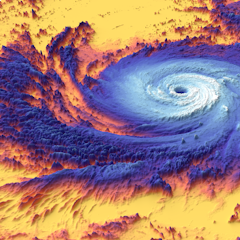
Articles on Tropical cyclones
Displaying 1 - 20 of 62 articles

We reviewed evidence on traditional knowledge in the Pacific for coping with climate change, and found much of it was scientifically plausible.

The new threat from cyclones can come from behind you – flooding from more intense rainfall.

A heatwave in 2022 redefined scientific expectations of the Antarctic climate. Now the global community must prepare for what a warmer world may bring.

Currents can carry that deep ocean heat hundreds of miles to surface again at distant shores.

2016 was the world’s warmest year on record, due in part to a very strong El Niño event. But 2023 (and 2024) could beat that record – what should we expect?

Do record-breaking wind speeds mean a particularly catastrophic storm? Not always – and it can be tricky to get precise measurements.

Cyclone Ilsa has intensified off the Western Australian coast and is now classed as a category-five system. How did this happen?

The record-breaking Cyclone Freddy was a wake-up call to prepare for the storms of the future.

Tropical cyclones are becoming more frequent in the Indian Ocean. Here’s why and what that means.

Climate change is making oceans more acidic globally. Now, scientists are finding that large storms can send pulses of acidic water into bays and estuaries, further stressing fish and shellfish.

Research shows storms that might have caused minimal damage a few decades ago are becoming stronger and more destructive as the planet warms.

Evacuations can save lives, as in the case of post-tropical cyclone Fiona. As more frequent extreme weather events are set to occur, it is important to have evacuation plans in place.

A reconstructed record of cyclone activity going as far back as 1850 has revealed interesting trends, both around Australia and globally.

Southern Africa’s current above-average rainfall is a climate variability signal - a short-term fluctuation in average wet-season conditions.

Global floods in 2021 showed the danger of poor emergency preparedness - and the importance of planning ahead.

As the climate changes, the ocean is also changing. And that’s putting our health at risk.

Climate change is likely to mean disasters such as Cyclone Seroja will become more intense, and be seen further south in Australia more often.

Wetlands bear the brunt of much storm damage to the coast. But over the past 300 years, 85% of the world’s wetland area has been destroyed.

At the start of the cyclone season in the Pacific, weather forecasters are changing their warnings to focus less on weather information and more on the damage expected from an impending storm.

Hurricane stalling has become common over the past half-century, and their average forward speed has also slowed.
